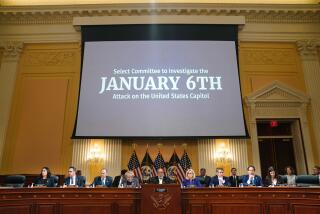Push for Terror Panel Gets Boost
- Share via
WASHINGTON — In a surprising turnabout, the Bush administration Friday dropped its opposition to the establishment of an independent commission to investigate the Sept. 11 terrorist attacks, removing a major impediment to its creation.
The administration’s announcement came after three days of congressional hearings that spotlighted intelligence lapses leading up to last year’s attacks on the World Trade Center and the Pentagon.
While the White House announcement was a significant development in the effort to establish an independent commission--similar to the one established after the attack on Pearl Harbor that brought the U.S. into World War II--details of the panel’s makeup and its scope must be worked out.
The Senate is expected to vote for the independent review early next week as part of its consideration of legislation creating a Department of Homeland Security.
The House in July voted to create a National Commission on Terrorist Attacks Upon the United States.
Despite this congressional support, the proposal appeared to be headed nowhere because of the administration’s opposition.
With House and Senate intelligence committees conducting a probe of lapses by intelligence agencies, the administration considered an independent commission unnecessary.
The White House also was concerned that another inquiry could distract intelligence officials working to detect terrorist threats.
But Friday, the administration expressed its “strong support” for an independent commission, saying it would build upon the work of the congressional investigation.
“Now that the work of the intelligence committees is nearing its end, we must take the appropriate next steps,” Nicholas E. Calio, the White House’s chief congressional lobbyist, said in a letter to congressional leaders.
“Although the intelligence committees’ joint inquiry focused extensively on intelligence matters, it did not address the panoply of other important and related issues as they may relate to Sept. 11, such as coordination between the intelligence community and non-national security agencies, border security and visa issues, commercial aviation and the role of state and local governments.”
Political analysts attributed the administration’s change of attitude in part to this week’s emotional testimony in support of an independent review by the families of victims of last year’s attacks.
“When the victims’ families say they want a commission, it’s hard to say no,” said John J. Pitney Jr., a government professor at Claremont McKenna College.
“It’s a matter of both emotion and reason. The emotion lies in the image of grieving relatives who want answers,” Pitney added.
“The reason lies in the sensible argument that Congress lacks the time and resources to do the job properly.”
Sen. Joseph I. Lieberman (D-Conn.), who with GOP Sen. John McCain of Arizona is pushing for an independent commission, welcomed the White House announcement. But he noted that the administration did not commit to support a specific proposal.
Lieberman and McCain’s proposal calls for creating a 10-member panel made up of “prominent U.S. citizens with national recognition and backgrounds in government service, law enforcement, the armed services, legal practice, public administration, intelligence gathering, commerce, and foreign affairs.”
Appointments would be evenly divided between Democrats and Republicans.
More to Read
Sign up for Essential California
The most important California stories and recommendations in your inbox every morning.
You may occasionally receive promotional content from the Los Angeles Times.










